by Erika Solberg
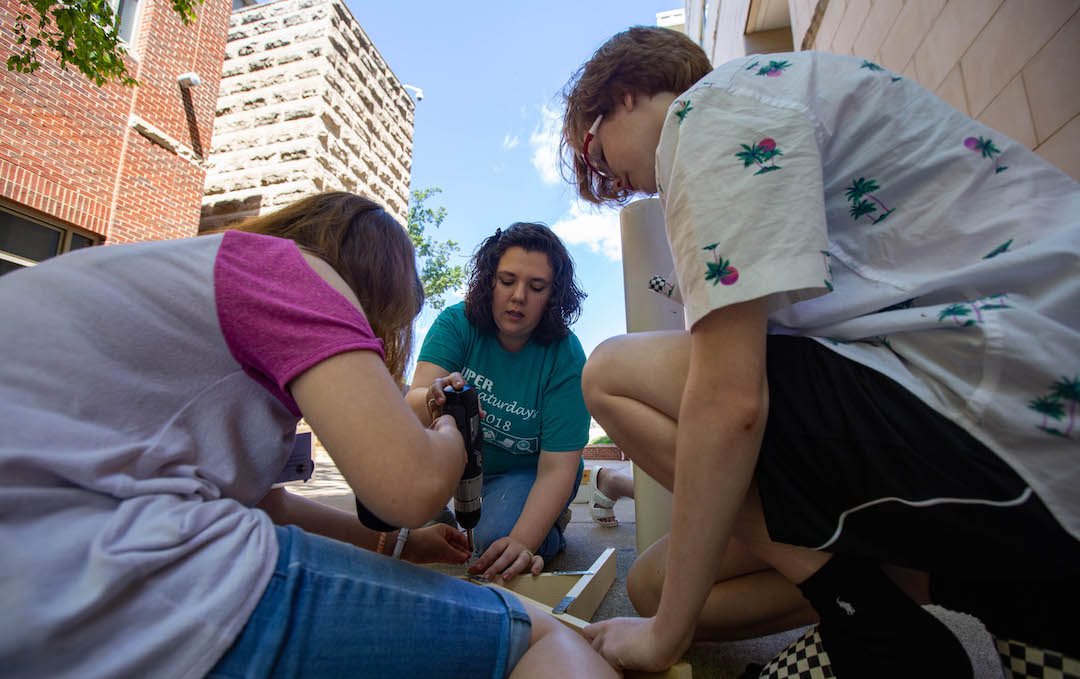
On the second Wednesday of VAMPY, the classroom for Problems You Have Never Solved Before smelled like marshmallows, and Teaching Assistant (TA) Robin Tyler was supervising the testing of catapults. As each student team of two or three launched their marshmallow from a contraption made from rubber bands, craft sticks, and hot glue, Robin marked the landing spot with the end of a yardstick, measured, and calculated the distance travelled so teacher Catherine Poteet could enter the data into a spreadsheet.
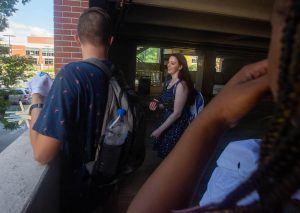
This year is Robin’s fourth TA-ing for Catherine, and the two work in easy fellowship, making jokes with the students and each other. “Next year,” Catherine says to Robin, after the students correct one of their calculations, we’re getting nametags that read, “Expert in My Field.”
If experience is a sign of expertise, Robin has definitely achieved it. She first worked as a VAMPY TA in Astronomy in 2015 before moving on to the Problems class. Since that time, she has graduated from WKU with a degree in science education and spent half a year teaching at South Warren Middle School. In August, she will move to a full-time position at Franklin-Simpson. She has worked at the camp for multiple years in part, she says, because “you don’t get much of an opportunity to get as close to students during the summer as you do at VAMPY, and it keeps me on my game.”
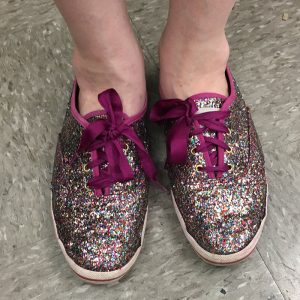
With her red-hennaed hair, sparkly Keds with mauve laces, and sundress whose fabric is a photo of a coral reef, complete with deep green and blue water and tropical fish, Robin as usual dressed the part of a creative-thinking engineer on Wednesday. When the students began working on their second and hopefully improved iterations of their catapults, she played many roles — cutting up craft sticks with an X-Acto knife to students’ specifications, delivering rubber bands to teams, ensuring that the student who toppled over in his chair was okay (he was), consulting with Catherine about how they would adjust the afternoon lesson, reminding the students that the hot glue table was only for hot gluing, and asking students questions about their designs.
Later, after the second round of testing was over, the class played a game designed to strengthen group cohesiveness. The day before, the students, Catherine, and Robin, had written down a unique fact about themselves no one else knew, and now they were trying to match the fact to the class member. Several correctly guessed that Robin could not consistently tie her shoes until fourth grade.
Robin’s combination of instructor, colleague, student supervisor, idea-sparker, and community member is familiar to VAMPY TAs, who becomes not only their students’ educator and role model for three weeks but often their friend. Just as small class size, long hours spent together, and a shared affinity for learning can create strong bonds among campers, so too can these factors create a unique relationship between campers and their TAs.
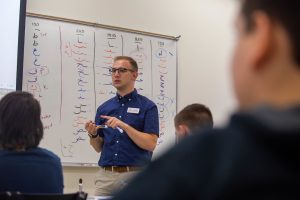
What TAs actually do during class time varies from course to course. In math, the TAs work with students one-on-one as they work at their own pace through math curriculum such as geometry or Calculus II. In other classes, such as Arabic, TAs instruct the whole class in specific course content. Last week, Arabic TA Noah Stevens, a recent WKU graduate in international affairs, Arabic, and Middle East studies, lead a language lesson on terms for family members, helping students read and answer basic questions together. Noah frequently asked, “Do we understand that?” and the class either answered “Nem” (“Yes”), or he clarified the material.
In other courses, TAs moderate debates, participate in discussions, guide students when they work on hands-on projects, and, for the classes that take the trip to D.C., spend two nights on a bus full of teenagers. TAs also are also in charge of the evening study halls.
For many TAs, 2019 is their first working at VAMPY, and they are enjoying being exposed to the camps’ enthusiastic students and expert teachers. Astronomy TA Madison Wells, who graduated from WKU in May and will be teaching biology at Butler County High School this fall, says, “I like the strong academic focus. It’s exciting to see the students so immersed in the classroom. There’s a sense of community, and they’re working with their peers all the time, even after class ends.” Presidential Politics TA Russell Marshall, a freshman at LSU studying psychology, comments, “the students are all very mature and intelligent. I love hearing them debate.” For Computer Science TA Dimple Jaiswal, a WKU computer science graduate student from central India, being a TA lets her “see things that I have not seen for a long time. When I observe their creativity, it makes me think about when I was young like they are.” As for Chemistry TA Avery Harmon, an incoming WKU freshman, she appreciates the campers’ personalities: “They’re all chill and easy to talk to.”
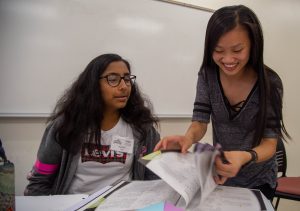
Bek Zhoroev, WKU graduate student in math from Kurdistan, and Mia Sword, a WKU sophomore studying math education, are the TAs for Math. Bek most enjoys working with students on calculus, while Mia appreciates working with high-ability and high-interest students: “I’ve worked with a lot of students that have difficulties with math, but here it’s the exact opposite. They’re so thoughtful and are always challenging themselves. I have to find ways to continue to challenge them. One strategy is that I always ask, ‘Why are you doing this? How is this related to the context or situation?’”
Jana LaRue is in her first year as a TA in Nazi Germany and the Holocaust, but as an alum of SCATS (2009) and VAMPY (2010-11), she is familiar with the camp atmosphere and with the course itself, which she took in 2011. She explains that when long-time course teacher Ron Skillern offered her the position, “I said yes without even hesitation!” In particular, she is looking forward to “seeing what the students do with the mural, because that was the project I worked on when I took the class.”
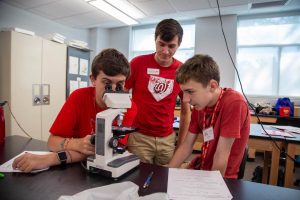
The experienced TAs also have certain things they are looking forward to. Colten Collings, TA for the second time in DNA and Genetics, majored in science and math education at WKU and will teach at Bowling Green High School in the fall. He says, “I enjoy having only 13 students or fewer. You really get to know them on a personal level that you don’t get in a regular classroom — what they like, what they don’t like, how they interact together.” Ryan Hiles, second-year TA for Humanities who graduated from the University of Louisville with a degree in philosophy and English, notes, “I get to employ what I studied in college — I don’t get to talk about Dante much in my regular life!”
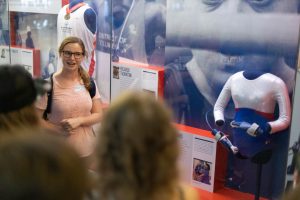
Fallon Russell, a WKU junior with a double major in Spanish and professional writing and a minor in ESL, is the TA for the second time in Pop Culture. She does all the art projects along with the student, such as this week’s oversized paper mache objects based on Claes Oldenburg’s giant sculptures of everyday objects. Last Tuesday, Fallon worked on an oversized coffee mug, pale blue with white flowers, while Grease was playing. Later in the course she will lead the lesson on Dancing through the Decades. She comments, “I love seeing everyone so excited to learn and having so much fun while they’re learning. I get to have fun along with them.”
For Allie Millay, second year TA in Writing, the highlight is seeing her students’ progress: “ I love to see their final projects because they’re so creative, and they’re such talented writers. It’s great to see their confidence growing.” Allie graduated from WKU with a degree in English for secondary education and will be able to put her TA experience to work when she begins teaching at Owensboro High School in the fall.
The TA with the most experience is Allison Gregory, a freelance writer who graduated from WKU in 2016 with a degree in English. She has worked with her former high school physics teacher, Kenny Lee, for eight years — Kenny himself was the TA for past VAMPY teacher Doug Jenkins. She has favorite lessons and enjoys trying new ones: “We’re about to start Newton’s laws — those are a lot of fun because of the demonstrations — they learn how to do magic tricks. Balloon helicopters are usually the students’ favorite. We’re going to try a new build this time, Cartesian divers. I don’t know how they’ll go, but we’ll see.”
One of the biggest challenges for the TAs is the long day. They often arrive by 8:00 a.m., teach until 4:15 p.m., take a dinner break, and then come back to pick up the students for study hall around 7:45 p.m, dropping then back at their dorms around 9:15 p.m..
For Revolutions TA Chloe Young, a WKU junior majoring in history and social studies for secondary education, the biggest challenge as a first year TA is “seeing what I can do to best help the teacher — and figuring out the copy machine” (a rite of passage for every TA).
In many courses, discussions can grow passionate, and TAs have to find a balance between letting students express themselves and not crossing the line into disrespect. Jana, however, says, “We have some very varied opinions in our class, but the students handle the debates well, especially for people their age. They’re very mature and civil — sometimes more so than people my age.”
In study hall, Jana spent part of of week one watching and discussing a movie that documents the rise of Hitler and his psychology. Study hall often include discussion time, but like class time, activities and TAs’ duties, vary. Study hall can functions as a way to prepare for upcoming content. Allie explains, “The goal for Writing is to give the students some skills to use the next day in class. Typically, we’ll start by reading in their copy of A Writer’s Notebook by Ralph Fletcher, and then they spend some time writing in their own notebook using the skills that they learned from the book.” Fallon says, “One of the big projects in Pop Culture is the Pop Madness debate. It’s a bracket-style competition, and we have people, objects, events, and entertainment. During study hall, we spend time in the computer lab so they can research and prepare.” Dimple usually will “help with anything the students are lagging behind in, and then have them do some brainstorming about the upcoming project.”
Sometimes study hall also entails more personal discussion. Madison notes, “I go over content and get them ready for assessments, but I also answer questions — for example, they wanted to know why I like astronomy and how I got interested in that area. That time is also about building relationships with students.”
For experienced TAs, study hall may be split between the teacher’s plans and what the TAs are inspired to do with their students. Colten likes to do a lesson about probability: “We look at examples of data to see if it’s real or fake, and we look at how statistics and probability actually work.” Allison says, “We might do some pages in our workbook, and then for the rest of the study hall I decide if they do builds or projects.”
For Robin, “Because I’ve been the TA for so long, I have a list of ideas to work from. Sometimes it’s obvious what to do, like finishing a project, and our study halls becomes an extension of our class. Sometimes I’ll throw in something else. We might do an activity like Hypothesis Cubes because they’ve been building all day and need to do something that does not involve hot glue.”
Given that many of the TAs are training to be or already are professional educators, VAMPY is also a useful learning experience for them. Some of the skills they gain are general, and some relate specifically to working with gifted students. Madison says, “Being a TA is helping me to learn more about incorporating hands-on learning experiences that challenge students to think outside the box and apply skills.” Chloe notes, “In history, it’s easy to default to saying, ‘Here’s a PowerPoint slideshow — go ahead and take notes’ so I love seeing the different ways Jan Lanham gets them interacting with each other and being creative as they learn new content.
Mia feel better equipped to work with gifted students: “In a classroom with 30-plus students, you can get those who are not struggling at all and end up bored, so I’m learning strategies and questions to ask them so that the high-ability students will still be engaged.”
As for Allie, she says, “When I have gifted students in my classroom, I’ll know what kinds of questions I need to ask and how I can push them beyond the concrete and into the abstract.”
Being a VAMPY TA can be challenging, but like VAMPY students, the TAs like a good challenge, especially with the rewards the experience provides. Allison sums it up when she says, “The students are passionate. They want to be here, and they want to learn this stuff. It’s great, and that’s why I keep coming back!”
